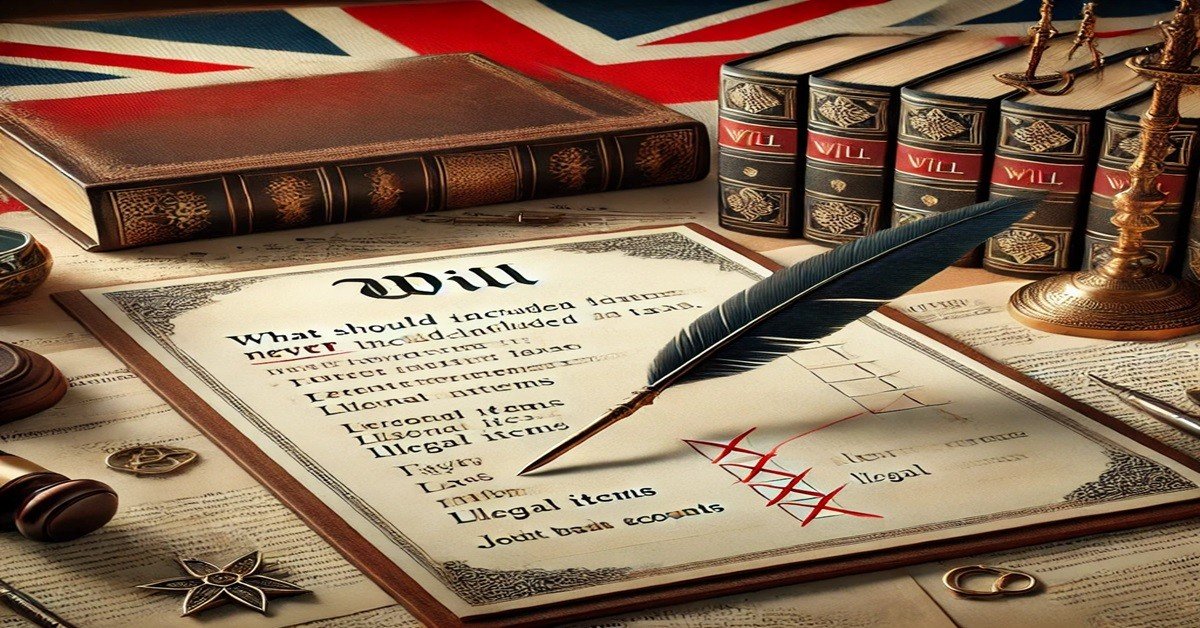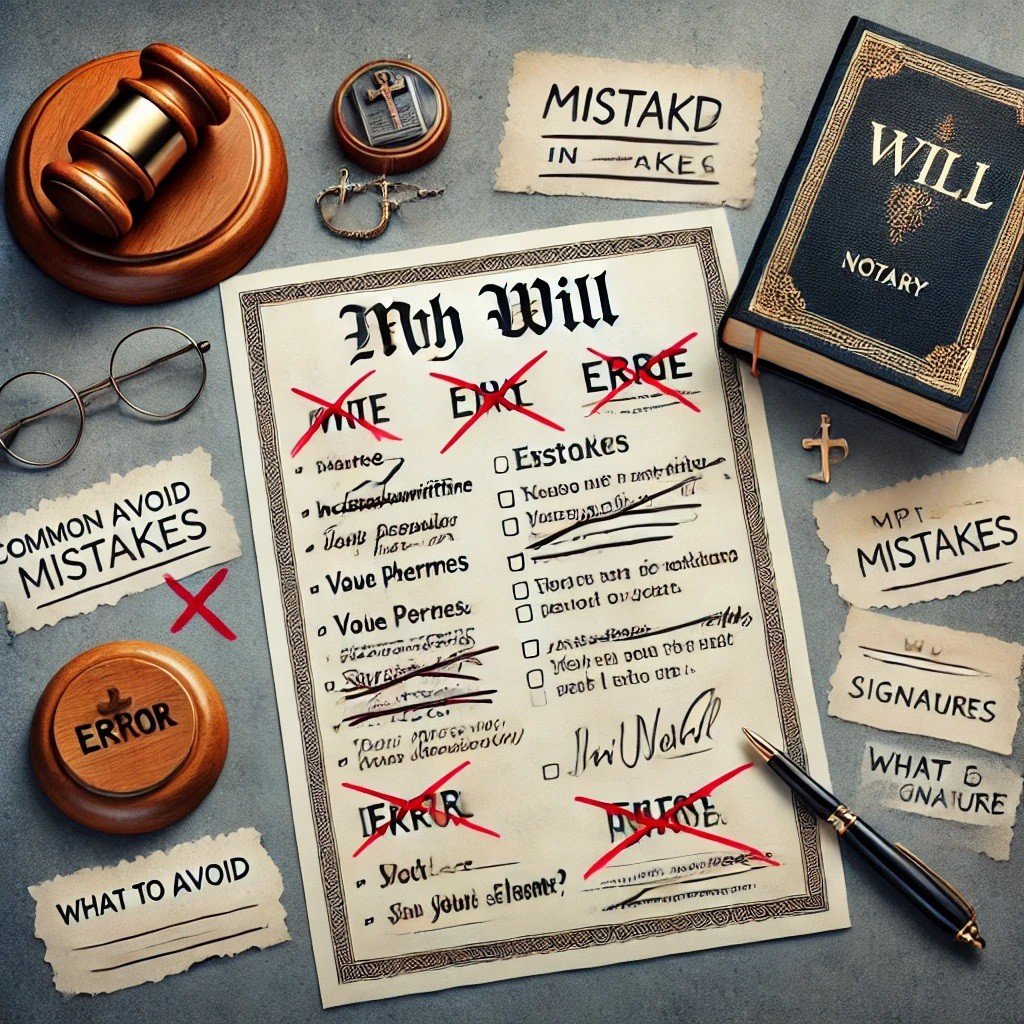
Writing a will is vital. It protects your loved ones and ensures your assets go where you want after you die. Many people make common mistakes when writing their wills, including adding things that should never be there. Knowing what you should never put in your will UK is crucial, as these errors can lead to confusion, legal issues, and even disputes among family members.
This article will guide you on what to avoid in a will and why. It’s vital to avoid these mistakes to make your will clear, binding, and protective of your loved ones.
At Orangelegal, we write wills tailored to your unique circumstances. Our service helps you avoid common pitfalls and ensures your will is legally sound. With our expertise, your wishes will be respected, and your family will be well cared for.

It may seem wise to attach conditions to gifts in your will. For example, you might leave money to a relative only if they finish university or get married. These gifts, though well-intended, can cause legal issues. In many cases, they are difficult to enforce, and the conditions you set might not be considered legally valid.
For example, a vague or unreasonable condition could confuse your executor or family. In some cases, it may even result in disputes between relatives who disagree about whether the conditions have been met. Keep your will simple. Avoid conditions that could complicate managing your estate.
To encourage certain behaviours, consider methods beyond your will. For example, create a trust managed by someone else.
Unsure about what to include in your will? Speak to Orangelegal about our expert will-writing services and get it right the first time.
It’s a common misconception that you should include your funeral arrangements in your will. Wills are often not read until after the funeral. So, your funeral instructions may not be followed. This can cause stress and confusion for your loved ones during an already difficult time.
It’s better to discuss your funeral wishes with your family than to include them in your will. Alternatively, leave a letter of wishes outlining your preferences. This document can be kept with your will. It should be read as soon as it’s needed. That will ensure your funeral is carried out as you wish.
Another option is to pre-arrange your funeral using a funeral plan. It lets you make the arrangements in advance and relieve your family’s burden.
We all love our pets, and many people want to ensure that their pets are cared for after they pass away. However, UK law treats pets as property. So, you cannot leave money or assets to your pet in a will. This can cause confusion if you attempt to do so, as the law does not recognise pets as beneficiaries.
The best approach is to name a trusted person to care for your pet after your death. Leave money or assets to that person for your pet’s care. This way, you can ensure that your pet is looked after, and the funds are available for their needs.
Setting up a pet trust is another option, which allows you to set aside money specifically for the care of your pet. This provides peace of mind that your beloved animals will be taken care of according to your wishes.
If you own property or a joint bank account with someone, like a spouse or partner, you do not need to include those assets in your will. UK law states that, when one joint tenant dies, their share of the property or assets passes to the other joint owner. It happens automatically. This is true for joint tenants. The surviving joint owner takes full ownership of the property.
Including jointly held assets in your will can cause confusion. These assets are not part of your estate. They will pass automatically to the co-owner. To avoid misunderstandings, it’s best to leave these assets out of your will. Also, understand how joint ownership affects your estate’s distribution.
To change how your jointly held assets are distributed, you may need to change the ownership structure (e.g., from joint tenants to tenants in common) before writing your will.
Many think they must include their pension plans and life insurance in their wills. But, this is not necessary. Pension plans and life insurance policies usually have named beneficiaries. So, they are handled outside your will. These assets go to the beneficiaries you named in the policy. So, don’t include them in your will.
To update your beneficiaries, contact your pension or life insurance provider to make the changes. It’s vital to keep these details up to date. They ensure your assets are distributed as you wish after you die.
If you own a business, it’s important to understand that business assets are often treated differently from personal assets in a will. Depending on your business’s structure, you may need a separate plan. It should detail how to manage or transfer your business after your death.
In some cases, you can include business assets in your will. But, get professional advice to ensure your business succession plan is legal. This will help keep your business running. It will care for your employees, partners, and clients.
At Orangelegal, we can help you create a comprehensive estate plan that covers both your personal and business assets.
If you co-own property, vehicles, or other items, do not include them in your will. This is because you do not have the legal right to give away something that isn’t entirely yours. Including co-owned items in your will can confuse your executor and beneficiaries. They may lack the authority to distribute those assets.
Instead, make sure that your will only includes assets that are fully owned by you. This will ensure that your estate can be distributed easily and without any legal complications.
It’s natural to want to explain your will’s decisions. But, detailed explanations can complicate matters. Too much detail may hinder your executor. It could delay your estate’s distribution.
It’s better to keep your will clear and simple, focusing on the key points. If you want to give more details, write a letter of wishes. It can be read with your will. This document isn’t legally binding. It lets you explain your wishes in more detail, without causing complications.
As we rely more on digital services, we often overlook digital assets in estate planning. These include social media accounts, online banking, and digital photos. However, these assets may need to be managed or closed after your death, so it’s important to consider them when writing your will.
Don’t list your login info and passwords in your will. It’s a security risk. Instead, create a separate document. It should give your executor the info they need to access and manage your digital accounts. This will help ensure that your online presence is handled according to your wishes.
Use Orangelegal’s probate services. They cover all your assets, including digital ones. Find out more and contact us today!
It’s important to remember that not everything you want can be included in a will. Illegal or impossible requests are not valid and will not be enforced by the courts. For example, you cannot ask someone to commit a crime or leave unfulfillable instructions.
To make your will valid and enforceable, seek professional advice. At Orangelegal, we can help you write a legal will that respects your wishes.

A key element of your will is appointing an executor. This person will manage your estate and ensure your wishes are carried out. If you have minor children, you’ll also need to appoint a guardian who will take care of them if anything happens to you.
Not appointing these individuals can delay your estate’s administration. It may also cause your loved ones unnecessary stress. Make sure to clearly name an executor and, if applicable, a guardian to avoid any confusion.
Inheritance tax is a key consideration when writing your will, as it can significantly affect the value of the assets you leave behind. Without a plan for inheritance tax, your family may pay too much tax. This will reduce what they inherit from your estate.
It’s wise to get help to make an estate plan. It should reduce the impact of inheritance tax. Many allowances and exemptions can reduce your estate’s tax burden. A legal expert can guide you through these options.
Worried about inheritance tax? Orangelegal can help you plan to protect your assets with our inheritance tax services. Get in touch for a consultation!
Your will should reflect your current circumstances. So, review and update it after any major life event. This could include getting married, having children, buying a house, or a big change in your finances.
If you don’t update your will after a life event, it may not reflect your wishes. Your loved ones might not get your intended assets. Regularly review and update your will. This keeps it current and valid.
DIY will kits are cheap. But, they often cause mistakes. These can make the will invalid or unenforceable. Common errors include failing to meet the requirements for signing and witnessing the will, which could render it void in the eyes of the law.
To avoid these risks, it’s always best to seek professional advice when writing your will. A legal expert will draft your will and meet all legal requirements. This will give you peace of mind that your estate will be handled as you wish.

Writing a will is more than just deciding who gets what. It’s about clearly stating your wishes. It must care for your loved ones. Your estate should be distributed to avoid legal disputes. Professional legal advice is key to ensuring that your will is legally binding and that your assets are protected.
At Orangelegal, we specialise in will writing, probate, and estate planning. We can guide you through the process, making sure your will is tailored to your specific needs and that all legal requirements are met. This provides both you and your family with peace of mind.
Planning for the future? Let Orangelegal help with care planning and LPA services. They will give you and your family peace of mind.
Avoiding these common mistakes will ensure your will is clear, legally sound, and easy to execute, giving your loved ones the protection they need during a difficult time. It’s important to leave out certain things and make sure your requests are reasonable and enforceable. Understanding what you should never put in your will UK can help you avoid unnecessary complications.
If you need help writing or updating your will, contact Orangelegal today. Our team can guide you and help you create a will. It will reflect your wishes and protect your family.
Interested in learning more about legal matters that could affect you and your loved ones? Check out these helpful articles from our blog:






Orange Legal is a trusted legal service provider, committed to your legal needs. Experienced, compassionate, and dedicated legal professionals here to serve you.
© 2024 Orange Legal | All Right Reserved. Website Design by Web Head Way